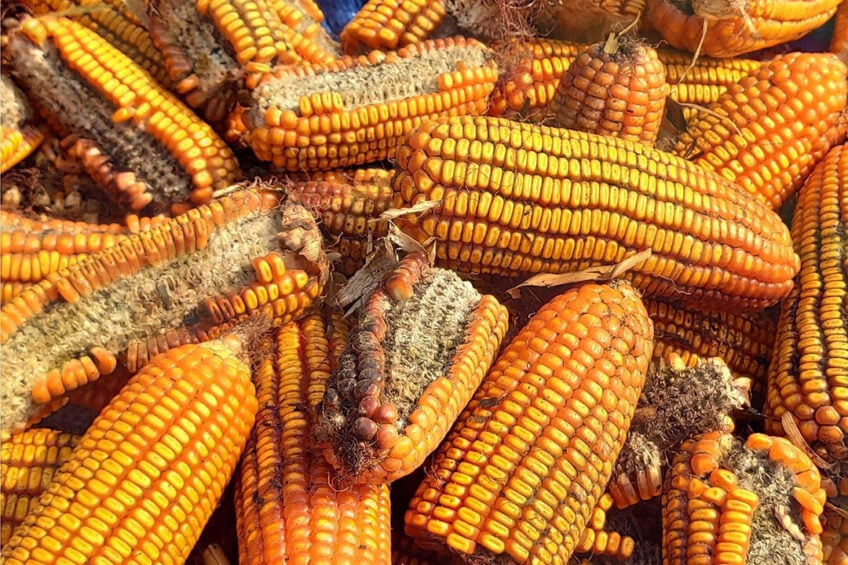May 16, 2025 | 04:20 GMT +7
May 16, 2025 | 04:20 GMT +7
Hotline: 0913.378.918
May 16, 2025 | 04:20 GMT +7
Hotline: 0913.378.918

Mycotoxins are frequently found in poultry feed, with the DSM World Mycotoxin Survey showing that more than 33,000 analyses of finished poultry feed tested positive for mycotoxins in the last 10 years (2013-2023). Photo: Canva
Animal health and nutrition company, DSM-Firmenich, says producers need to look at 3 considerations to evaluate the impact of mycotoxins on poultry farms:
-Measure the contamination levels in ingredients and finished feed.
-Include mycotoxins as potential predisposing factors to health challenges.
-Assess low-level mycotoxin contamination on performance and profitability.
Mycotoxins are frequently found in poultry feed, with the DSM-Firmenich World Mycotoxin Survey showing that more than 33,000 analyses of finished poultry feed tested positive for mycotoxins in the last 10 years (2013-2023). And of these, more than four-fifths of samples (83%) are contaminated with more than 1 mycotoxin and as many as 50 mycotoxins were found in a single sample.
Exposure to multiple mycotoxins simultaneously can lead to more severe effects on health and bird performance, so the company suggests testing the finished feed and/or their ingredients to evaluate the risk for the bird’s health.
Although clinical signs of the effects of mycotoxins are often not seen in broilers due to their short life cycle, scientific evidence shows they can have major impacts, including the destruction of the villus of the intestines, which harms nutrient absorption and digestion while increasing leaky gut and modulation of the local immune response and the microbiota, which increases the opportunity for vaccine failure and dysbiosis.
Decreased nutrient absorption
Mycotoxins, especially deoxynivalenol (DON) and fumonisins (FUM), affect several aspects of intestinal integrity. They reduce the functionality of tight junctions between the intestinal cells, opening up the opportunity for pathogens and antinutritional factors to move from the intestinal barrier to the bloodstream.
This challenges the immune system and liver, redirecting nutrients and energy away from growth. The liver is directly affected by most mycotoxins. In broilers, visible fatty degeneration and an approximately 15% increase in liver weight were reported. This reflects an increased cost of nutrients and amino acids, particularly methionine, which is the first limiting amino acid for broilers.
Vaccination failure
Modulation of immune response is one of the main modes of action of mycotoxins which can impact how birds respond to disease challenges and vaccination practices. Mycotoxins are a predisposing factor in reducing the immunity to viral diseases in broilers. Ochratoxin, DON, T2, cyclopiazonic acid significantly reduced the antibody titre for Newcastle Disease, infectious bronchitis virus, infectious bursal disease virus, and hydropericardium syndrome. It increases bird susceptibility to infectious diseases that could be avoided under normal conditions.
Predisposition for coccidiosis and Necrotic Enteritis
There is evidence suggesting that low to moderate doses of different Fusarium mycotoxins (DON, NIV, FB1, T-2, Zen) predisposed birds to a more severe response to a coccidiosis and Necrotic Enteritis challenge as shown with reduced immune response and efficacy of the anticoccidial treatment.
Food safety contamination
Evidence of higher susceptibility to Salmonella typhimurium and Campylobacter jejuni have also been reported in the presence of DON and T2, suggesting these compounds may modulate bacterial metabolism.
DSM said a data compilation of scientific trials had shown that the presence of mycotoxins in poultry diets significantly reduced (p<0.05) feed intake by 12% and bodyweight gain by 14%, resulting in an impaired feed conversion ratio of 7% when compared with non-contaminated groups.
And results from a cooperation project with the University of Ghent show a synergistic negative effect between a dysbiosis-challenged diet and additional DON (5mg/kg) and FB1 (20mg/kg) on broiler performance, which showed that the reduction in broiler performance was sustained through the final phase of production.
(PW)

(VAN) Fourth most important food crop in peril as Latin America and Caribbean suffer from slow-onset climate disaster.

(VAN) Shifting market dynamics and the noise around new legislation has propelled Trouw Nutrition’s research around early life nutrition in poultry. Today, it continues to be a key area of research.

(VAN) India is concerned about its food security and the livelihoods of its farmers if more US food imports are allowed.

(VAN) FAO's Director-General emphasises the need to work together to transform agrifood systems.

(VAN) Europe is facing its worst outbreak of foot-and-mouth since the start of the century.

(VAN) The central authorities, in early April, released a 10-year plan for rural vitalization.

(VAN) Viterra marked a significant milestone in its carbon measurement program in Argentina, called Ígaris, reaching 1 million soybean hectares measured.